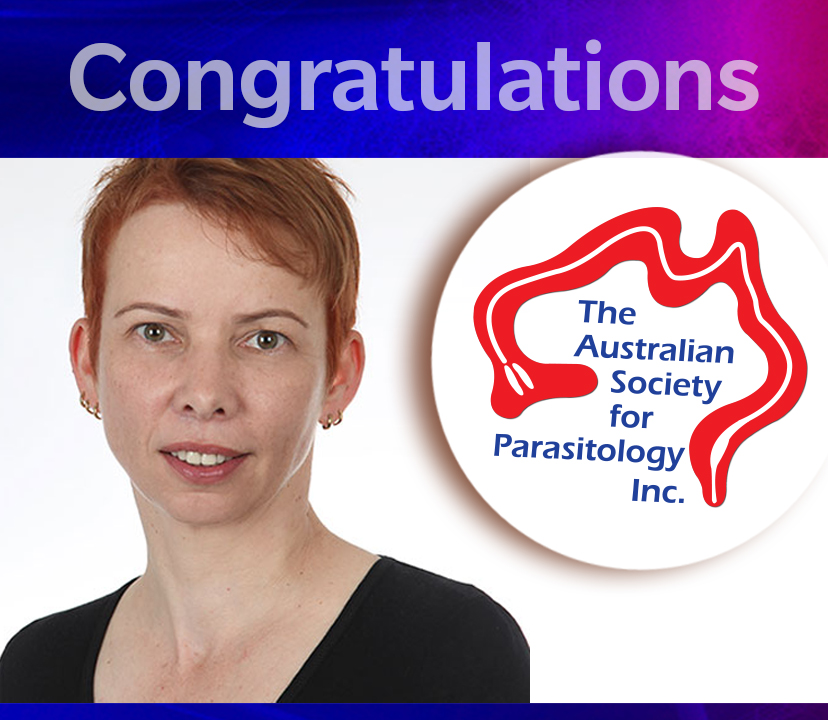Congratulations to Dr. Katja Fischer who was awarded the 2020 Bancroft-Mackerras Medal for Excellence from the Australian Society for Parasitology.
Katja Fischer heads the Scabies laboratory at the QIMR Berghofer Medical Research Institute in Brisbane.
She completed a Diploma in Biology/Parasitology in 1991 from the University of Freiburg, Germany and in 1998 completed her PhD in Molecular Parasitology from the University of Würzburg. After graduating from her PhD, she migrated to Australia as a research officer and then senior research officer at the QIMR Berghofer Medical Research Institute. In 2013, she was awarded an ARC Future Fellowship, which she recently completed in 2018. She has been group leader since 2014 and is currently an NHMRC senior research fellow (2019-23). She also holds Adjunct appointments at the University of Queensland (2000-) and Griffith University (2005-).
Katja is an excellent scientist and next to the most influential clinicians in this field, she is the most prolific author of basic scabies research worldwide (‘Web of Science’) with >80 papers (and 44 as lead/senior author). Her research is published in journals ranking highest in the fields of Tropical Diseases and Parasitology. Her original research papers published prior to 2013 in the Journal of Immunology, Journal of Molecular Biology and the Journal of Biological Chemistry are the only original research manuscripts on scabies ever published in higher ranking mainstream journals.
Over the course of her career, she has received ~$8M in funding and was sole CI on NHMRC New Investigator Project (2009-12). Scabies (and associated bacterial disease) is a globally increasing problem with widely underrated downstream complications. In Aboriginal and Torres Strait Islander communities of remote northern Australia, scabies prevalence is high and extreme rates of scabies-associated streptococcal and staphylococcal infections cause a significant public health burden. Her group, which has been working on scabies for more than 15 years, is focused on understanding the molecular interactions of scabies mite molecules with host defence systems in the skin, which is central to developing new options for reducing scabies incidence and improving disease outcomes.
Katja’s research has resulted in major contributions to our understanding of scabies globally: she
1. Pioneered molecular biology research of scabies (Fischer 2003), resulting in genomic resources that have major impact in the field (evidenced by >20 publications).
2. Produced the first recombinant proteins/crystal structures for scabies mites, and defined virulence factors that interfere with complement, coagulation and the skin barrier.
3. Identified 8 drug targets and 3 drug candidates with pharmaceutical potential.
4. Defined the molecular mechanisms underlying mite/bacterial co-infections and
5. Developed a unique and internationally recognised porcine in vivo model for scabies (PLoSNTD, 2010), a crucial resource for research and commercialization internationally (PLoSNTD, 2016).
Together with three other colleagues, she also currently holds a patent (WO 2016/201528A1), granted in 2016, for treating inflammation and/or cancer by administration of an isolated EgKI-1 protein. She has been a consultant for Hatchtech Pty Ltd (a head lice treatment pharmaceutical company) since 2016, as well as for Sarantis Pty Ltd (recombinant protein expression in Pichia yeast, 2006) and Mayne Pharma, (scabicide testing, 2015).
Katja is a founding member and Lead Scientific Advisor of the International Alliance for the Control of Scabies (IACS), which is the sole international alliance advocating for scabies and achieving a change in its status through WHO. She served on the Cooperative Research Centre for Aboriginal and Torres Strait Islander Health Advisory Board and is currently the Scientific Advisor for ‘Orange Sky Australia’, a mobile laundry service for people in need. In this role she helps develop community-led initiatives to improve hygiene standards, reduce the spread of infectious diseases, improve health outcomes, increase education and awareness and provide local employment opportunities. She also works to actively recruit, mentor and foster Indigenous researchers and students and on request tests bush medicines, balms and oils from native plants for acaricidal properties.
Her current research involves:
1. national and international partnership with leading experts in bioinformatics to establish the first comprehensive fully assembled and annotated, high quality scabies mite genome, integrated with the mite proteome and transcriptome, which will be an invaluable resource
to identify candidate target proteins for drug discovery and diagnostics.
2. analysing the scabies mite associated microbiota to elucidate the impact of scabies on the microscopic organisms living on healthy skin and to identify new strategies for treating scabies and secondary infections and
3. understanding the molecular mechanisms that underpin the intricate links between mites and bacteria to identify therapeutic options
Her scientific standing in the community is evidenced by 42 invited talks and chairs in past decade, 33 of which were at international conferences and she was on the organising committee for the 2016 International Congress for Tropical Medicine and Malaria in Brisbane. Her profile has resulted in invited reviews in influential journals including Advances in Parasitology, the International Journal for Parasitology, Trends in Parasitology (2019) and Clinical Microbiology Reviews (2019) and she was also invited to become Chief Editor for Springer Nature Book. Katja is a Guest Editor for PLoS Neglected Tropical Diseases, for which she also regularly reviews manuscripts. She is a frequent reviewer for the British Journal of Dermatology, Frontiers in Microbiology and Allergy.
In addition to her scientific contributions to the field of Parasitology, Katja has also made significant contributions to the ASP and has been involved in a wide range of outreach activities.
In view of her outstanding contributions to science, parasitology and the society, Katja Fischer is an extremely worthy recipient of the Bancroft-Mackerras Medal of the Australian Society for Parasitology.








